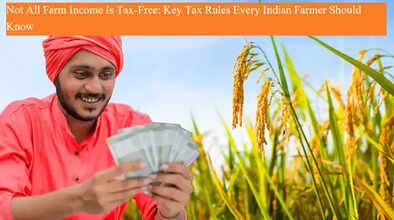Not All Farm Income Is Tax-Free: Key Tax Rules Every Indian Farmer Should Know

In India, agricultural income is widely believed to be exempt from income tax. While this is true in most cases, not all earnings from farming activities enjoy this tax-free status. There are certain situations where a farmer’s income may fall under the taxable category, depending on the source and nature of the income. Here's a detailed guide to help farmers understand when agricultural income is truly exempt and when it may be subject to taxation.
When Is Agricultural Income Tax-Free?
As per Section 10(1) of the Income Tax Act, income earned directly from agricultural operations such as growing crops or harvesting produce is exempt from income tax. This exemption is intended to provide financial relief to farmers and support the agrarian economy. For example, income generated from selling crops like wheat, rice, or vegetables grown on agricultural land is completely tax-free.
When Can Farm-Related Income Become Taxable?
Despite the broad exemption, not every farm-related income qualifies for tax relief. Here are key scenarios where taxation may apply:
1. Income from Other Sources Alongside Farming
If a farmer earns income from sources other than agriculture—like a job, business, or consultancy—then their overall income is considered for taxation. In such cases, the agricultural income is used for calculating tax rates on the non-agricultural income through a method known as Partial Integration of Agricultural Income. While the agricultural income itself remains exempt, it can push the tax slab higher for the rest of the income.
2. Professional or Corporate Farming
If a person is involved in contract farming or large-scale corporate farming where processing, packaging, and marketing activities dominate over traditional cultivation, then the income may be treated as business income. In such instances, the earnings are taxable just like any other profession or enterprise.
3. Income from Leasing Farmland
When a farmer leases out their land and earns rental income, it is not treated as agricultural income. This rental income is taxable under the head "Income from Other Sources." To qualify as tax-free, the income must be generated through active farming and not mere land ownership.
4. Earnings from Forestry and Wild Products
Income earned from selling forest produce like timber or wild herbs that grow naturally on the land is not considered agricultural income. However, if such products are cultivated through farming practices, the income can be exempt. Otherwise, it may fall under the taxable bracket.
Government Subsidies and Grants
Any subsidies or grants provided by the central or state governments for agricultural inputs like seeds, fertilizers, or equipment are completely exempt from tax. These benefits are also covered under Section 10(1) of the Income Tax Act and are intended to reduce farming costs, thereby supporting agricultural productivity.
Filing Income Tax Return (ITR): When Is It Required?
Even if agricultural income itself is exempt, a farmer may need to file an ITR if their non-agricultural income exceeds the basic exemption limit (e.g., ₹2.5 lakh for individuals below 60 years). The ITR filing becomes mandatory in such cases, especially when agricultural income influences the tax slab rate on other income sources.
Keep Proper Documentation
To prove agricultural income in case of scrutiny by the Income Tax Department, it is essential to maintain proper records. This includes:
-
Land ownership or lease documents
-
Sale receipts from agricultural produce
-
Bills for agricultural inputs and equipment
Having these documents readily available can help avoid disputes and ensure smooth tax compliance.
Final Thoughts
While farming income in India generally enjoys tax exemptions, farmers must remain aware of the conditions under which tax may apply. Understanding the nuances of agricultural income taxation can help avoid legal issues and ensure financial clarity. Keeping accurate records and being aware of the latest rules is crucial for every farmer in today’s changing tax environment.

